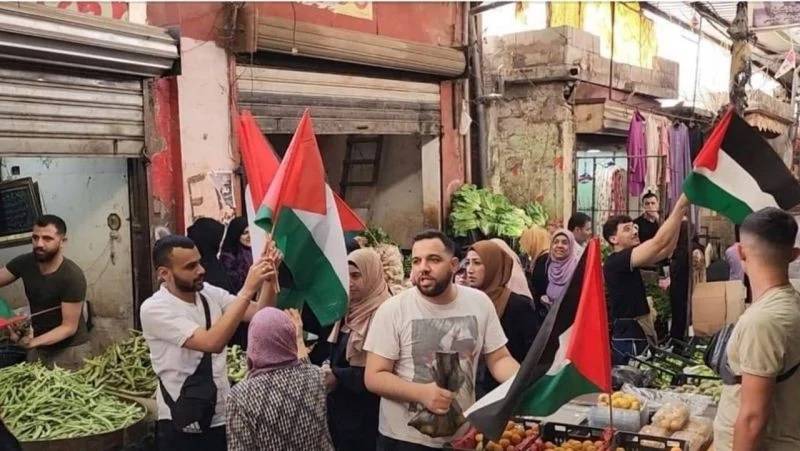
Inhabitants of Saida carry Palestinian flags on Sunday. (Credit: Montasser Abdallah/L'Orient Today)
BEIRUT — On balconies, in the streets, between shopkeepers' shelves and on market stalls, many Palestinian flags were raised Sunday by residents of Saida, South Lebanon, our correspondent in the city reported. The display of solidarity with Palestine came in response to the controversial Israeli "march of the flags," which is taking place Sunday in Jerusalem. For the Israelis, this march marks the anniversary of the "reunification" of the Holy City, that is, the annexation of East Jerusalem by the Jewish state in 1967.
Here's what we know:
• "We are raising these flags as a sign of support for the sons of our people in Al-Quds [the Arabic name for Jerusalem], to tell them that they are not alone," said Fouad Osman, a member of the Popular Committee of Ain al-Hilweh Palestinian refugee camp in Saida. "The Palestinian cause is present everywhere, our right to return cannot be taken away from us," he continued. Other demonstrations of solidarity are planned for Sunday and Monday in Saida, organized by local parties and members of Hamas in Lebanon.
• Late Sunday morning, Israeli police were on alert before the start of the march at 13:00 GMT, amind a tense atmosphere.
• In his last televised address on Wednesday, Hezbollah leader Hassan Nasrallah warned against a conflagration in Jerusalem, which he said could have extreme consequences for the region. "In the coming days, events could occur in Palestine and cause a big explosion there. The Israelis are going to carry out the "March of the flags" by walking through the streets of the Old City of Jerusalem, and this will cause tensions," he said. "Any attack on the Al-Aqsa Mosque and the Dome of the Rock will cause a great explosion in the whole region, with unbearable consequences. I call on everyone to be ready for what may happen around us in the region," he added.
• The march route passes by the Wailing Wall, the holiest prayer site in Judaism, whic his located below the Esplanade of the Mosques. It allows entry into the Old City through the Damascus Gate, overlooking the Muslim Quarter where the Esplanade of the Mosques is located, the third holiest site in Islam and the holiest site in Judaism, which refers to it as the Temple Mount. But this route does not allow access to the Esplanade of the Mosques, which houses the Al-Aqsa Mosque, a hot spot of tension with the Palestinians.